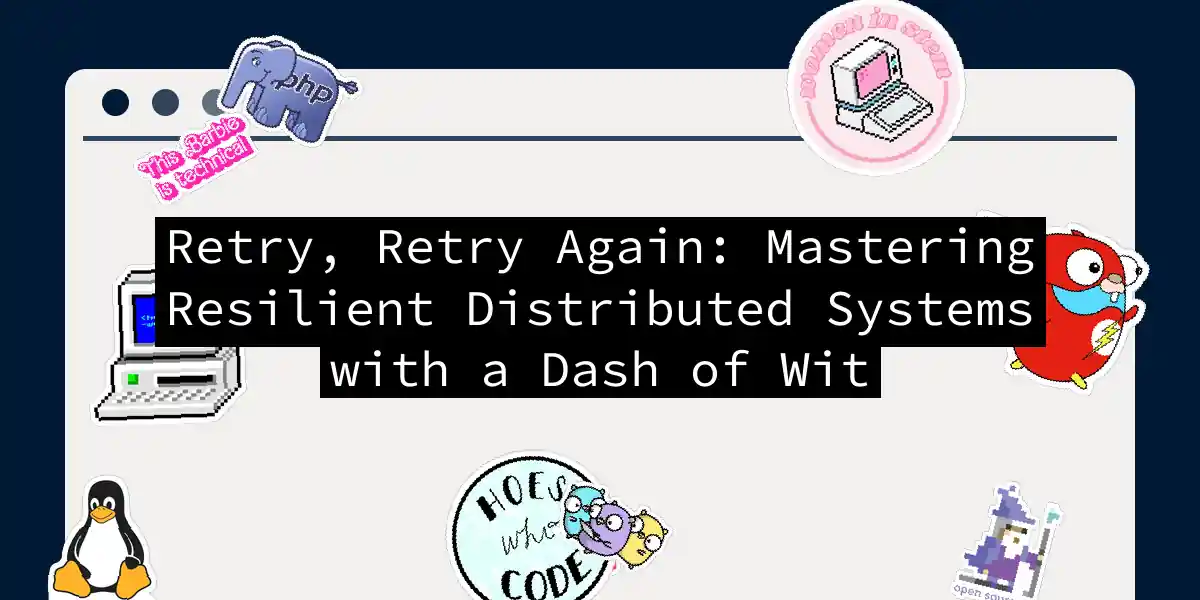Picture this: You’re at a party, trying to get another slice of pizza. The first attempt fails because someone swipes the last pepperoni. Do you give up? No! You check again in 30 seconds. Still no pizza? Wait a minute. Check once more. This is retry logic in its most delicious form - and today we’ll turn you into the Gordon Ramsay of resilient distributed systems.
When Life Gives You HTTP 500s…
Let’s start with a truth bomb: distributed systems are like my last relationship - they will fail when you least expect it. But unlike my ex, we can actually fix these problems with smart retry strategies. The 3 Golden Rules of Retrying:
- Never retry non-transient errors (like HTTP 404 - that pizza’s gone forever)
- Always cap your attempts (no one likes a stalker)
- Add randomness to your retries (avoid synchronized stampedes) Here’s how I implement this in Python - with extra sass:
import time
import random
from dataclasses import dataclass
@dataclass
class RetryConfig:
max_attempts: int = 5
base_delay: float = 0.3 # Start at 300ms
jitter: float = 0.5 # Add up to 50% randomness
def retriable(func, config: RetryConfig = RetryConfig()):
def wrapper(*args, **kwargs):
for attempt in range(1, config.max_attempts + 1):
try:
return func(*args, **kwargs)
except TransientError as e:
if attempt == config.max_attempts:
raise RetryExhaustedError(f"Failed after {attempt} attempts") from e
backoff = config.base_delay * (2 ** attempt)
jittered = backoff * (1 + random.uniform(-config.jitter, config.jitter))
time.sleep(jittered)
print(f"Attempt {attempt} failed. Taking a {jittered:.2f}s nap 💤")
return None
return wrapper
This code combines exponential backoff with jitter - like giving your system espresso shots that get progressively stronger, but with random milk splashes to avoid predictability.
The Dance of Distributed Systems
Let’s visualize this retry tango with a sequence diagram:
Notice how each retry attempt increases the wait time while adding randomness? This prevents the “retry stampede” effect where thousands of clients simultaneously bombard your already struggling service.
Circuit Breakers: The Relationship Counselor
Sometimes you need to stop trying and give the system space. Enter circuit breakers - the Marie Kondo of distributed systems:
class CircuitBreaker:
def __init__(self, threshold=5, reset_timeout=60):
self.failure_count = 0
self.threshold = threshold
self.reset_timeout = reset_timeout
self.state = "CLOSED"
def execute(self, operation):
if self.state == "OPEN":
raise CircuitOpenError("Nope. Not falling for this again!")
try:
result = operation()
self._reset()
return result
except Exception:
self.failure_count += 1
if self.failure_count >= self.threshold:
self._trip()
raise
def _trip(self):
self.state = "OPEN"
threading.Timer(self.reset_timeout, self._reset).start()
def _reset(self):
self.state = "CLOSED"
self.failure_count = 0
Combine this with our retry logic, and you’ve got a system that knows when to push forward and when to take a breather - like a mindful meditation app for your microservices.
War Stories from the Trenches
Last year, I accidentally DDoSed our own authentication service by forgetting two crucial elements:
- Retry Budgets: Limiting retries per minute across all services
- Deadline Propagation: Making sure retries respect upstream timeouts The result? Our monitoring looked like a Bitcoin price chart during a bull run. Lesson learned: always pair retries with:
@retriable(config=RetryConfig(max_attempts=3))
def make_request_with_timeout():
return requests.get(url, timeout=(3.05, 27)) # Yes, these specific numbers matter
The Idempotency Imperative
Before you go retry-crazy, remember: retrying non-idempotent operations is like replaying your awkward middle school years - you’ll get the same cringey results. Always ask:
- Can this operation be safely retried?
- Are we using idempotency keys?
- Have we tested the failure scenarios… twice?
Parting Wisdom (and Dad Jokes)
Implementing retries is like making guacamole - it’s all about the right ingredients in the right proportions:
- 2 cups of exponential backoff
- 1 tbsp of jitter
- A pinch of circuit breaking
- A squeeze of monitoring (Prometheus optional but recommended) Remember: a good retry strategy is like a good joke - timing is everything. Get it right, and your systems will be laughing all the way to the bank (of five nines reliability). Now go forth and retry responsibly! And if all else fails… maybe try that pizza party analogy again? 🍕
